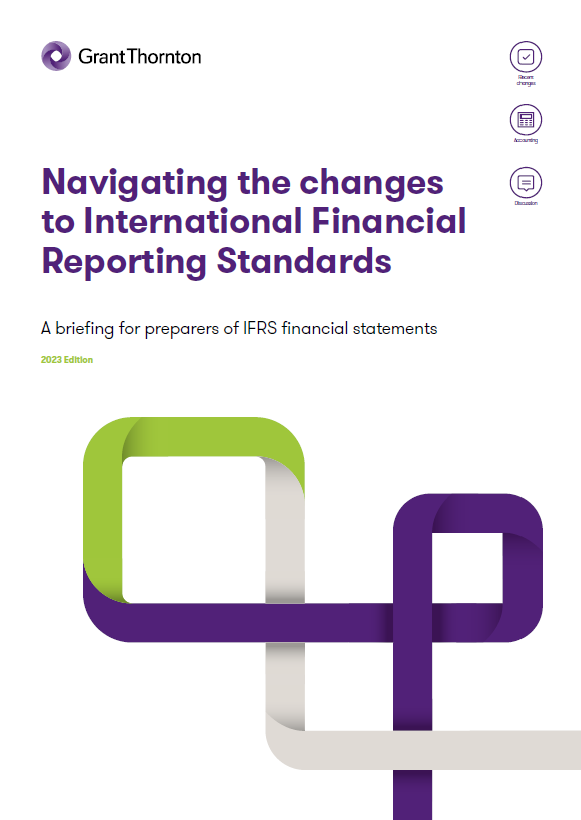-
Audit methodology
At Grant Thornton, we use a single audit methodology across our global network. This means that our clients gain the same proven, high-quality approach wherever they are.

-
Financial statements and consolidated financial statements
Preparation of monthly, quarterly or annual report and consolidated report on the basis of information presented by the client.
-
Financial Accounting
Effective bookkeeping and financial accounting are essential to the success of forward-thinking organisations. To get the optimum benefit from this part of your business, you'll need an experienced team behind you.
-
Tax compliance
Tax is likely to have an impact on almost every business decision you make. Whatever your business’s specific needs, we respond quickly and devise solutions tailored to you. We perform VAT, income tax, social tax and other tax accounting as well as present tax declarations to the tax authorities.
-
Chief financial officer service
Chief Financial Officer services include the periodic reporting, information systems standardization, internal document management and information flow optimization, budget preparation, cost accounting, cash flow and working capital management, financial analysis, investment return evaluation for managers.

-
International taxation
Grant Thornton operations in the Baltic States give us an access to the international expertise and allow advising the client on the minimisation of tax risks arising from conducting business in a foreign tax jurisdiction. We also consult foreign investors in finding an optimum group structure and form of enterprises in Lithuania and other Baltic States.
-
Transfer pricing
We advise the management bodies of local and multinational groups of companies in issues concerning transfer pricing of intra-group transactions and, if necessary, in the preparation of the relevant compliance documents. We also assist in preparing transfer pricing policies in order that future transactions are priced in accordance with the local as well as international regulations.
-
VAT refunds
We advise foreign clients in issues concerning the refund of value added tax paid in Lithuania, and Lithuanian clients – in the refund of value added tax paid in the EU member states. If necessary, we carry out these procedures on behalf of the client.
-
Profit tax, tax incentives
Our tax advisory department consults local and international clients in both everyday and specific taxation issues related to business activities.
-
Due diligence
Making the right investment decision can have a significant impact on shareholder value. To make an informed investment decision and create the best value from the transaction you will need the following an understanding of the target business identification and understanding of key business drivers an understanding of all the relevant issues clear analysis, conclusions and recommendations.
-
Assistance and representation during tax investigations, inspections, disputes
We provide services for registration in the Register of Taxpayers and the Register of VAT Payers. We represent clients' interests in tax disputes at the State Tax Inspectorate, Tax Disputes Commission, courts and other institutions.

-
Legal advisory for business start
We assist to quickly establish a company, branch or permanent establishment in Lithuania, open a bank account, VAT registration and obtain all necessary licenses for activity.
-
Legal advisory for business development
Our team has gained the greatest experience in advising international companies on the management of groups of companies. We advise and implement reorganizations or liquidations. Together with a team of tax and financial advisors, we perform a comprehensive due diligence (tax, legal & financial).
-
Labor law for CEOs and employees
We provide modern labor law solutions for the CEO, C-level managers and employees, which are tailored specifically to your business industry. We will take care of well-judged employment contracts and benefits package, protection of confidential information and non-compete agreements, handling of employee data or stock option rules, posting of employees, employment of EU and third-country nationals, organization of telework.
-
Fintech
With extensive experience in money laundering prevention and compliance and a strong team of financial experts, we advise clients on financial services, electronic money, licensing of payment institutions, capital formation, listing of mutual lending platform operators and other operational issues.
-
Migration and relocation
We assist you, your family members and employees of the organization to obtain national and European Union (Schengen) visas, residence permits, e-resident status, provide mediation letters and ensure a smooth relocation to Lithuania.
-
Due diligence
Making the right investment decision can have a significant impact on shareholder value. To make an informed investment decision and create the best value from the transaction you will need the following an understanding of the target business identification and understanding of key business drivers an understanding of all the relevant issues clear analysis, conclusions and recommendations.
-
Fintech advisory
The rapidly changing world and evolving technology are driving the development of new business models such as acting as a payment institution, a provider of virtual currency services and a financial institution. Grant Thornton Baltic provides support and advice to these companies.
-
Corporate finance management
Building a successful business requires a clear vision backed by a focused strategy. To achieve this vision, businesses must negotiate an increasingly complex environment.
-
Business Valuations
Choosing the right valuation method is the most important element in the process of estimating the fair value of a business as it must be adequate in terms of the purpose and object of the valuation. Grant Thornton uses only proven and generally accepted methods from among the wide range of income, asset and market approaches. Having conducted a preliminary analysis of the object and purpose of the valuation, we identify the method that will be the most appropriate considering the situation and characteristics of a given enterprise and the business sector in which it operates. Prior to commencing valuation, we also identify the documents necessary in the process.
-
Mergers and acquisitions
We provide advice to clients in all material aspects of the process of conducting transactions: finding a candidate for buyer, purchase or merger, initial analysis and valuation, negotiations, due diligence, structuring transaction price, preparing legal documentation and formal closing of the transaction. We also provide consultation for management buyouts.
-
Protection of Interests of Bondholders'
Grant Thornton provides bondholders' advocacy and protection services. We have resources, knowledge and the latest technology. Defending the interests of bondholders · Representing the interests of bondholders
-
External Financial Management Services
Providing an external financial management services makes it possible to manage a company’s finance on a day-to-day basis by a competent economist, without the need of offering full-time employment. By cooperating with experts on managing big-budget projects, we provide our clients with excellent support in comprehensive management of company’s finance.
-
Training
Financial Management Training and Seminars. Our experts have significant regional competence and close co-operation with our global colleagues. They happily share their expertise with our clients.

-
Internal Audit Services for Financial Sector Companies Licensed in Lithuania
Internal audit services adapted to Lithuanian financial sector companies ensure compliance with regulatory acts, risk management and operational excellence.
-
Internal Audit Services for EU/Foreign Aid Projects
Internal audit for EU/foreign aid fund projects helps to ensure compliance of activities and related costs with requirements.
-
Internal Audit for the Companies Certified by ISO
Internal auditing ensures ISO standard compliance, evaluates management system effectiveness, and gathers objective evidence of performance.

A successful idea and growth are truly inspiring factors, financial experts agree. However, they remind us of an important point - in the idyll of business growth, quite simple fundamentals such as financial flow management are sometimes forgotten.
There are now areas in the market whose rapid development and growing demand for business services are dictated by the circumstances of the times - one such sector is renewable energy, the development of which is driven by increased energy costs and increasing pressure to counter the effects of climate change.
"It's really good news that there are sectors where new businesses can start and grow. As experts in our field, we do not want to extinguish the inspiration that accompanies a manager who has caught the vein of a successful business. We just want to remind them - take care of your finances so that they become a bright illustration of business health", says Inga Miliauskienė, head of financial and business consulting department at Grant Thornton Baltic.
Financial management is a necessity for a growing business
According to Inga, there are cases when the head of the company feels that "something is wrong" and calls in an external financial specialist. Accounting books are opened - and lo and behold, there is no profit. There is a loss in the lines of the company's budget.
"Managers wonder how this could have happened, start learning things from scratch - how to manage inventory, what kind of accounting requirements to set. Everything would be much simpler if more attention was paid to financial management from the beginning", notes Inga.
Even a small company that can't afford or can't afford to hire a chief financial officer (CFO) at an early stage shouldn't leave the finance side to itself. "If the company does not have competence in financial basics, an external CFO can handle all the necessary functions and ensure that the business will not face problems due to disorganized finances in the future", says I. Miliauskienė.
According to her, financial management is a fundamental subject in order to grow, expand or attract external capital: The main tasks are financial planning, control and financial decision-making. It is not always easy to do this for the manager themself, who at this very moment is burning with the business idea and growth, but it is necessary to find time and use the necessary competence.
Financial hygiene and discipline
Financial flow management includes financial monitoring, analysis and optimization of the company's income and expenses. These actions make it possible to ensure that the company has sufficient funds to cover short-term obligations, such as paying bills, purchasing inventory, and paying salaries. Disciplined monitoring of working capital can help you forecast income and expenses, monitor whether these forecasts correspond to real-time capital flows, and ensure that customers pay their bills on time. Such discipline allows thenm to avoid undesirable consequences, such as higher costs of late payments, helps to take care of the right amount of inventory and maintain good relations between the supplier and the customer.
"An external financier can be equated to a senior financial officer of the company, depending on the company's needs. However, despite the titles, the purpose of this role is to create a business-friendly financial environment. This is taking care of the daily flows of funds, taking into account the expected investment, the degree of risk. It is also possible to predict the return of the business to the owners. It sounds simple, but it requires knowledge", emphasizes I. Miliauskienė.
Managers usually notice that the financial lines are not perfect during the development stage, when it is obvious that there is an opportunity to go to new markets, to grow the business, and for this there will not be enough own funds. And if external capital is needed, it is also necessary to orderly secure the company's financial base.
"For a company that is completely new to the market and only cares about product introduction and marketing, scrupulous financial supervision is not yet so vital. For example, startups often use business angels, who help take care of this "boring" part. However, development often becomes relevant for companies that have grown a bit and have been operating on the market for several years, then they realize that it is necessary to regulate their financial flows", I. Miliauskienė describes the circumstances when a business may need an external financial advisor.
It is important for a manager to know and ask the right questions
One can ask, is it really necessary for a business manager to know finances, or can he rely on their accounting specialists?
"If the manager doesn't provide important guidelines, accountants can add lines in their own way, choose their own accounting programs, count inventories at their own discretion. In order for everything to run smoothly, the manager should know the basics of financial management and be able to submit critical questions for accounting, formulate requirements for submitting financial statements so that they testify to the true health of the business. In my opinion, the basics of finance are necessary for a business manager," the expert believes.
If a manager is comfortable with finance, it will likely be easier for them to achieve their desired investment or working capital goals. A wrong description of the company's situation, a disorganized financial base can hinder good cooperation with investors and credit providers. On the contrary, strong financial arguments will be of great importance when investors or lenders make financing decisions.
"As you can see, applying for funding is approached formally and simply: numbers are evaluated. Thus, the manager must have the right numbers at his disposal, and if they do not control the information, they will be the weaker party in the negotiations. Therefore, I suggest to the managers not to leave financial management somewhere on the margins, next to the ambitions of growing the business", teaches the expert of "Grant Thornton Baltic".
According to her, uneven financial flows can make budget planning difficult, and for a fast-growing business, it can be important to invest in equipment, inventory, and other forms of capital. Businesses can become burdened by short-term liabilities, which can have serious consequences - commissions, fines, and ultimately, a threat to the company's reputation. "The manager must know all this if they want to continue to see that great picture of the business idea in reality," says I. Miliauskienė.
An external financier is not forever
When does a company or manager no longer need outside financial advisors, even though they have been great so far? According to Inga, it is not difficult to understand that. When a growing company needs a permanent person to oversee the day-to-day financial flows and, to put it simply, to attend company meetings every morning - then the financial advisor ends his project work in the company.
"The external financial advisor can remain the right hand, but if it no longer covers all the requests of the business manager, it's time to make a decision. When development processes begin, foreign markets are conquered, financial partners are sought, complex growth takes place, there may be a need to have a chief financial officer within the company. However, external assistance can always be used to monitor and control the company's financial plan," explains Inga.
Subscribe to audit, accounting, tax, legal and business consulting news. Be the first to receive Grant Thornton Baltic news, expert advice, professional business insights and event information.

